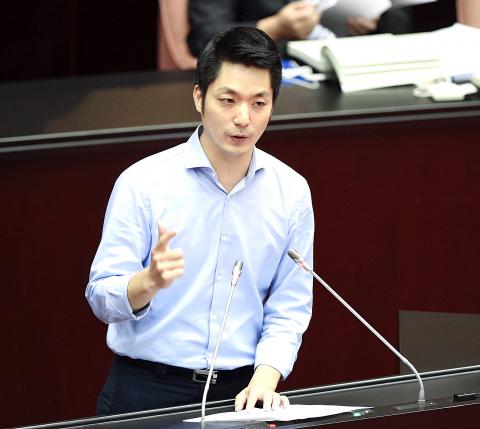Chinese Nationalist Party (KMT) Legislator Chiang Wan-an (蔣萬安) yesterday reaffirmed his opposition to China’s “one country, two systems” formula after his previous support for President Tsai Ing-wen’s (蔡英文) “four musts” drew ire from pan-blue supporters.
Chiang, grandson of former president Chiang Ching-kuo (蔣經國), first expressed opposition to the “one country, two systems” formula during a political talk show on Thursday last week, in which he also expressed support for Tsai’s “four musts” as a basis for cross-strait relations.
Tsai in her New Year’s Day speech on Tuesday last week said that China must recognize the existence of the Republic of China (ROC); respect the values of democracy and freedom that Taiwan’s 23 million residents hold dear; resolve cross-strait differences in a peaceful and equitable manner; and engage in negotiations with the government or an institution with a mandate from the government.

Photo: George Tsorng, Taipei Times
Chiang Wan-an’s support for Tsai’s position on cross-strait ties drew criticism from KMT supporters, with many attacking him on Facebook and some calling him a “separatist.”
A KMT member praising Tsai’s speech “is classic inexperience and naivety,” former KMT Central Policy Committee director Alex Tsai (蔡正元) said.
“When did Tsai Ing-wen and the Democratic Progressive Party (DPP) ever acknowledge the existence of the ROC? Does [Beijing] require the abolition of freedom and democratic systems [as part of unification]?” he asked.
The so-called “1992 consensus” is a peaceful way for Taiwan to achieve parity with China, Alex Tsai said.
The “1992 consensus,” a term former Mainland Affairs Council chairman Su Chi (蘇起) in 2006 admitted making up in 2000, refers to a tacit understanding between the KMT and the Chinese Communist Party that both sides of the Taiwan Strait acknowledge there is “one China,” with each side having its own interpretation of what “China” means.
Chiang Wan-an yesterday said that he supports the KMT’s definition of the “1992 consensus” that both sides of the Strait must be free to define “China” in their own way.
That freedom forms the basis of the “1992 consensus,” which is built on the foundation of the ROC Constitution and is executed through the Act Governing Relations Between the People of the Taiwan Area and the Mainland Area (台灣地區與大陸地區人民關係條例), he said.
While he does not agree with Tsai Ing-wen’s refusal to acknowledge the “1992 consensus,” he could not accept the “one country, two systems” formula, Chiang said.
“Taiwan is not Hong Kong,” he said, adding that most Taiwanese would not accept unification under the formula.
Whoever is president needs to follow the nation’s Constitution and protect its sovereignty, he said.
He added that regardless of who is president, they must acknowledge the existence of the ROC, protect democracy and the freedom of its citizens, and must resolve differences with China in a way that recognizes the equal legitimacy of the ROC and its institutions.
“If President Tsai refuses to accept the ‘1992 consensus’ and refuses to acknowledge its existence, I implore her to provide a specific solution for discourse with China, and not just throw around hipster slogans,” Chiang Wan-an said.

Beijing could eventually see a full amphibious invasion of Taiwan as the only "prudent" way to bring about unification, the US Department of Defense said in a newly released annual report to Congress. The Pentagon's "Annual Report to Congress: Military and Security Developments Involving the People's Republic of China 2025," was in many ways similar to last year’s report but reorganized the analysis of the options China has to take over Taiwan. Generally, according to the report, Chinese leaders view the People's Liberation Army's (PLA) capabilities for a Taiwan campaign as improving, but they remain uncertain about its readiness to successfully seize

Taiwan is getting a day off on Christmas for the first time in 25 years. The change comes after opposition parties passed a law earlier this year to add or restore five public holidays, including Constitution Day, which falls on today, Dec. 25. The day marks the 1947 adoption of the constitution of the Republic of China, as the government in Taipei is formally known. Back then the Chinese Nationalist Party (KMT) governed China from Nanjing. When the KMT, now an opposition party in Taiwan, passed the legislation on holidays, it said that they would help “commemorate the history of national development.” That

Taiwan has overtaken South Korea this year in per capita income for the first time in 23 years, IMF data showed. Per capita income is a nation’s GDP divided by the total population, used to compare average wealth levels across countries. Taiwan also beat Japan this year on per capita income, after surpassing it for the first time last year, US magazine Newsweek reported yesterday. Across Asia, Taiwan ranked fourth for per capita income at US$37,827 this year due to sustained economic growth, the report said. In the top three spots were Singapore, Macau and Hong Kong, it said. South

Snow fell on Yushan (Jade Mountain, 玉山) yesterday morning as a continental cold air mass sent temperatures below freezing on Taiwan’s tallest peak, the Central Weather Administration (CWA) said. Snowflakes were seen on Yushan’s north peak from 6:28am to 6:38am, but they did not fully cover the ground and no accumulation was recorded, the CWA said. As of 7:42am, the lowest temperature recorded across Taiwan was minus-5.5°C at Yushan’s Fengkou observatory and minus-4.7°C at the Yushan observatory, CWA data showed. On Hehuanshan (合歡山) in Nantou County, a low of 1.3°C was recorded at 6:39pm, when ice pellets fell at Songsyue Lodge (松雪樓), a